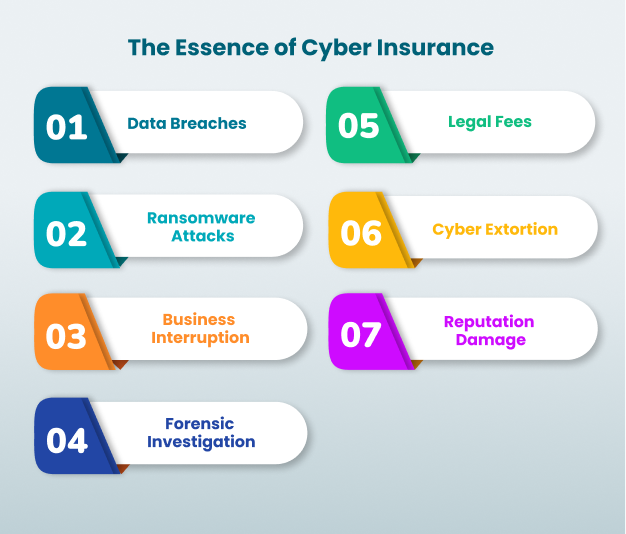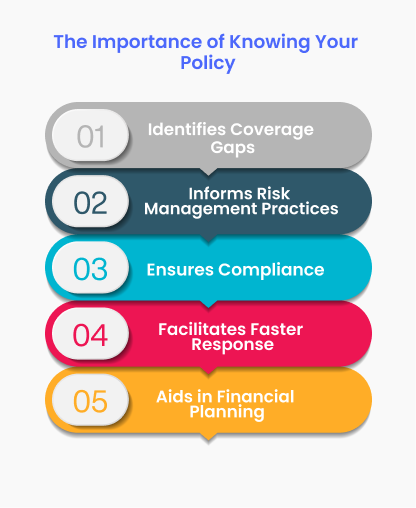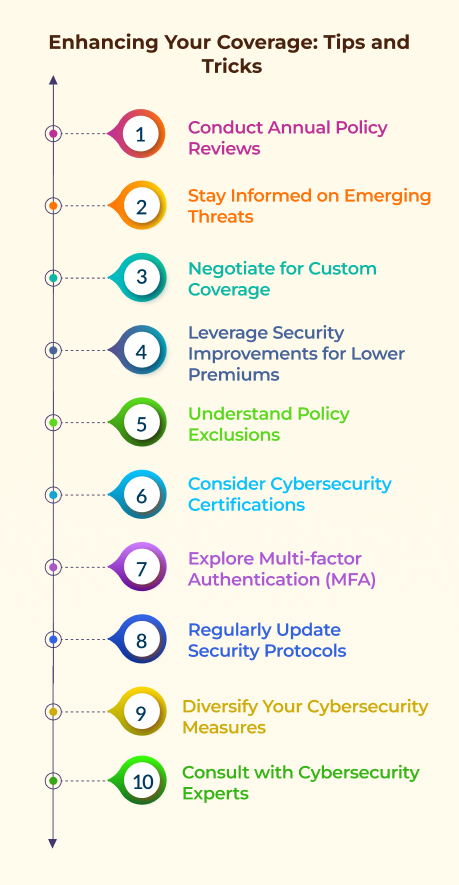Introduction: The Critical Role of Cyber Insurance
As businesses march forward into the digital future, the spectre of cyber threats casts a long shadow over their progress. Cyber insurance has emerged as a bastion of financial resilience, shielding companies from the tempest of online risks.
However, the assurance offered by these policies is not without its limitations, often delineated in the less traversed corridors of policy exclusions. Understanding these exclusions is paramount, as they delineate the boundary between security and vulnerability in the cyber insurance landscape.
The Essence of Cyber Insurance

What Cyber Insurance Covers
Cyber insurance policies are designed to mitigate financial risks associated with digital activities. Coverage can vary but typically includes:
- Data Breaches: Costs related to the unauthorised access of data, including customer notification, credit monitoring services, and legal fees.
- Ransomware Attacks: Expenses for negotiating with attackers, paying ransoms (if deemed necessary), and recovering locked or stolen data.
- Business Interruption: Compensation for lost income and increased costs of operation due to a cyber event that disrupts business activities.
- Forensic Investigation: Fees for specialists to investigate the cause and extent of a cyber breach or attack.
- Legal Fees: Costs associated with privacy lawsuits and regulatory fines due to breaches of data protection laws.
- Cyber Extortion: Protection against demands made by a hacker threatening to damage or release data.
- Reputation Damage: Services to manage and mitigate damage to a company’s reputation following a cyber event.
It’s important to note that while these coverages are common, specific inclusions can differ significantly across policies and providers. Some policies may offer additional protections tailored to the unique risks faced by certain industries or operations.
The Importance of Knowing Your Policy

Thoroughly understanding your cyber insurance policy is crucial for several reasons:
- Identifies Coverage Gaps: Knowing the details helps identify any gaps between the risks your business faces and the protections your policy provides.
- Informs Risk Management Practices: Understanding what’s covered can guide your internal cybersecurity measures, highlighting areas where more robust precautions are necessary.
- Ensures Compliance: Many policies require adherence to specific security standards or protocols. Familiarity with these requirements ensures that your coverage remains valid.
- Facilitates Faster Response: Knowing the extent of your coverage allows for a quicker, more coordinated response in the event of a cyber incident, potentially minimising damage and costs.
- Aids in Financial Planning: Clear understanding of your policy helps in financial planning and budgeting for potential out-of-pocket expenses due to exclusions or coverage limits.
Given the diversity in policies, businesses should work closely with their insurers to clarify any ambiguous terms and ensure their coverage aligns with their specific risk profile and operational needs. Regular policy reviews are also advisable to adjust coverage as new cyber threats emerge and as the business grows or changes its operational model.

Common Exclusions in Cyber Insurance Policies
- Prior Acts and Retroactive Coverage – Many policies do not cover incidents that occurred before the policy’s inception date, emphasising the need for continuous coverage.
- Intentional Acts and Insider Threats – Acts of fraud or dishonesty by company insiders are often excluded, highlighting the importance of internal controls.
- Wear and Tear, Degradation – Gradual deterioration of systems is not typically covered, underscoring the need for regular maintenance and updates.
- Acts of War and Terrorism – Some policies exclude damages caused by warlike events or acts of terrorism, a notable consideration in today’s geopolitical climate.
The Importance of Risk Assessment
Regular risk assessments are a cornerstone of effective cybersecurity strategy, allowing businesses to pinpoint potential vulnerabilities in their systems and processes. By identifying these gaps, companies can tailor their cyber insurance policies to ensure they are adequately protected against specific threats.
This proactive approach not only enhances security posture but also informs more strategic insurance purchasing decisions, aligning coverage with the unique risk landscape of each business. For instance, a company processing large volumes of sensitive customer data might prioritise coverage for data breaches and associated legal costs, while a cloud-based service provider might focus on protections against service interruptions and ransomware attacks.
Enhancing Your Coverage: Tips and Tricks

Regular reviews and negotiations of your policy can ensure that your coverage evolves alongside your business and the broader cyber threat landscape. Here are some Tips and Tricks to enhance your policy coverage:
- Conduct Annual Policy Reviews: Regularly review your policy with your insurer to ensure it matches your current business needs and risk profile.
- Stay Informed on Emerging Threats: Keep up with the latest cyber threats and trends to understand new risks that might affect your coverage needs.
- Negotiate for Custom Coverage: Don’t settle for generic policies. Negotiate terms that address the specific risks and needs of your business.
- Leverage Security Improvements for Lower Premiums: Implement recommended security measures to potentially qualify for lower insurance rates.
- Understand Policy Exclusions: Carefully review what is not covered by your policy and seek to minimise these gaps through negotiation or additional coverage.
- Consider Cybersecurity Certifications: Achieving recognized cybersecurity certifications can demonstrate to insurers that your business maintains high-security standards.
- Explore Multi-factor Authentication (MFA): Utilise MFA to strengthen your security posture and potentially negotiate better coverage terms.
- Regularly Update Security Protocols: Stay current with security updates and patches. Document these efforts to show insurers your commitment to cybersecurity.
- Diversify Your Cybersecurity Measures: Employ a range of security measures, including firewalls, anti-malware tools, and employee training programs.
- Consult with Cybersecurity Experts: Before renewing or purchasing new insurance, consult with cybersecurity professionals to identify any coverage gaps or enhancements needed.
The Future of Cyber Insurance
The realm of cyber insurance is rapidly evolving, driven by the continuous emergence of new digital threats and technological advancements. As cybercriminals become more sophisticated, leveraging artificial intelligence and machine learning to orchestrate attacks, insurers are responding by developing more nuanced policies that address these complex risk profiles.
Future policies are likely to offer more customised coverage options, tailored to the specific needs and vulnerabilities of individual businesses.
Moreover, the increasing prevalence of state-sponsored cyber attacks and complex regulatory landscapes, such as the GDPR in Europe and various data protection laws across the globe, are influencing the direction of cyber insurance policies.
Insurers are starting to offer more in the way of compliance assistance and coverage for regulatory fines and penalties, recognizing these as significant financial risks for businesses.
Conclusion
Mitigata’s smart cyber insurance offers a solution that not only meets the contemporary needs of businesses but also provides guidance on navigating and understanding policy exclusions. With Mitigata, companies can ensure they are adequately protected against both current and emerging digital threats, filling the gaps that traditional policies might leave uncovered.

